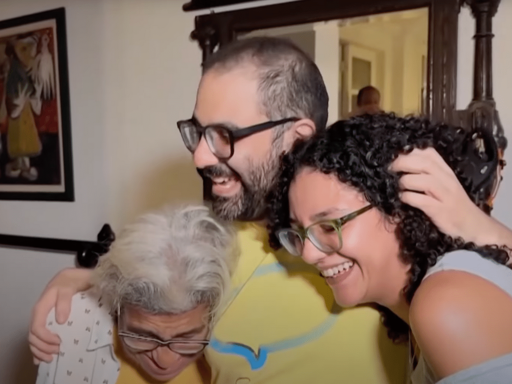Egyptian-British activist Alaa Abdel Fattah has been reunited with his family after being receiving a pardon. Alaa has been one of the most prominent political prisoners in Egypt, and activists have campaigned for his release for some time.
In 2022, the Canary reported that Alaa’s family were desperate for any signs of life after he was imprisoned for his key role in the Arab Spring. As we reported at the time:
Alaa Fattah, a key figure in the 2011 uprising that toppled longtime dictator Hosni Mubarak, is serving a five-year prison sentence for “spreading false news” by sharing a Facebook post about police brutality…
Alaa’s continued imprisonment is a threat to freedom of speech and democracy. Speaking out against police brutality shouldn’t result in a jail sentence, and the longer the British government choose to do nothing, the longer this injustice continues.
Now, Alaa could be seen celebrating with his relieved mother, Laila Soueif, and sister, Sanaa Seif. However, as Sanaa told the BBC:
she hoped it would mark the beginning of the release of other political prisoners detained under Sisi’s rule and the end of what she called a “very dark chapter”.
Alaa Abdel Fattah finally released
Mona Seif echoed her mother’s sentiments saying:
We’re happy, of course. But our greatest joy will come when there are no [political] prisoners in Egypt.
She added:
It has been the longest 12 years of this madness, and nightmare and heartache, and also journey full of love and ups and downs. And now Alaa is out, Alaa is free, Alaa is home.
Since 2014, Alaa Abdel Fattah has spent most of his time in prison. The charges have ranged from participating in so-called unauthorised protests, sharing posts about a prisoner dying of torture, and various other expressions of resistance. Just months ago, the United Nations Working Group on Arbitrary Detention found that Alaa had been held without cause or fair trial. The report urged Egypt to release him, writing that the government must take:
the appropriate remedy [which] would be to release Abd el-Fattah immediately and accord him an enforceable right to compensation and other reparations, in accordance with international law.
Richard Ratcliffe, the husband of Nazanin Zaghari-Ratcliffe who was held in Tehran for five years, said:
Having a ruling from the working group of arbitrary detention is a club no family wants to belong to. You worry repeatedly about whether to file, and then the UN system is so slow, so you can wait for years. Then when it comes, it is a moment of clarity – an acknowledgment of the injustice under international law.
The crime is not Alaa’s; the criminals are those still holding him, and provoking his family to desperation.
‘Journalism is not a crime’
Reporters Without Borders UK director Fiona O’Brien said:
We are deeply relieved to see Alaa Abdel Fattah finally walk free. What he and his family have been through is unimaginable: he should never have gone to prison, and his family should never have had to mount a years-long international campaign to free him. His pardon and release must mark a definitive end to their ordeal and, after so many lost years, he must be allowed to travel freely to the United Kingdom to be reunited with his son Khaled.
O’Brien continued:
As we celebrate Alaa’s freedom, we also remember the 19 other journalists still languishing in Egyptian jails, and hope that the long overdue resolution of this emblematic case will mark a turning point in Egypt’s grim history of repressing independent voices. Journalism is not a crime: those media workers still in jail must be released immediately.
After the ordeal Alaa Abdel Fattah’s family have been through, the fact they’re still so focused on other political prisoners in Egypt is testament to the whole family’s commitment to confronting power. And, O’Brien’s comments certainly have their place as journalism watchdogs keep a watchful eye. However, as Alaa and his family will be all too aware, there is an Orientalist and racist tendency to presume that journalistic repression is the domain of the East.
Israel’s genocide in Palestine has shown, for the umpteenth time, that Western media is just as rife with censorship and allegiances to power. Alaa’s experience of political repression in Egypt is a travesty that destroyed his life for the past 12 years. His family didn’t know if he was alive or dead as they undertook their own campaigns to release him, including hunger strikes.
However, the machinery of Western journalism is clogged with the same political repression. The only difference is that journalism in the Global North likes to pretend that it’s better than the Global South. While the hands that silence, smear, and strangle may be cloaked in more respectability, they are no less devastating.
Featured image via YouTube screenshot/Al Jazeera English
From Canary via this RSS feed


